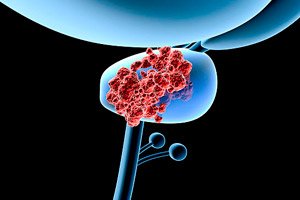
All iLive content is medically reviewed or fact checked to ensure as much factual accuracy as possible.
We have strict sourcing guidelines and only link to reputable media sites, academic research institutions and, whenever possible, medically peer reviewed studies. Note that the numbers in parentheses ([1], [2], etc.) are clickable links to these studies.
If you feel that any of our content is inaccurate, out-of-date, or otherwise questionable, please select it and press Ctrl + Enter.
How Gut Dysbiosis Triggers Prostate Cancer Growth: A Review of Current Evidence
Last reviewed: 09.08.2025
 ">
">In a review published in Trends in Molecular Medicine, Pei et al. (2025) summarize research on the gut-prostate axis, demonstrating that changes in the composition and metabolic activity of gut bacteria can not only accompany, but also stimulate the growth and aggression of prostate cancer (PCa).
Dysbiosis and hormonal influence
- Microbial 5α-reductases. Some intestinal strains (e.g., Clostridium genus ) express enzymes that convert testosterone to the more active dihydrotestosterone (DHT). Increased DHT in the bloodstream fuels the proliferation of AR-positive PCa cells.
- Lithocholic acid (LCA). Produced by Clostridia clades, LCA activates the Wnt/β-catenin signaling pathway in prostate tissue, enhancing its “tumor” transcription.
Inflammation and barrier dysfunction
- Lipopolysaccharides (LPS). When they “break through” the damaged intestinal barrier, LPS trigger systemic low-level inflammation via the TLR4–NF-κB pathway. This creates a favorable microenvironment for tumor growth.
- Decreased anti-inflammatory strains: Patients with aggressive PCa showed a decrease in Faecalibacterium prausnitzii and Bifidobacterium, which normally produce short-chain fatty acids (SCFA) and IL-10, which suppress inflammation.
Microbiota and response to therapy
- Antiandrogen therapy. Dysbiosis reduces the effectiveness of 5α-reductase inhibitors and AR-pathway blockers, complicating hormone resistance.
- Immunotherapy. Microbiota profile correlates with response to checkpoint inhibitors: presence of SCFA-producing bacteria improves cytotoxic T-lymphocyte infiltration into tumor.
Clinical Perspectives
- Diagnostic biomarkers. Analysis of the composition and metabolites of fecal microflora (LCA, SCFA profile) can improve the accuracy of risk stratification of aggressive PCa.
- Modulation of microbiota. Targeted probiotics ( Bifidobacterium, Akkermansia ) and prebiotics can restore balance by reducing LPS saturation and DHT levels.
- Faecal transplantation. A promising direction for refractory cases is the transplantation of “healthy” microbiota from donors with a low risk of PCa.
“Our work highlights that gut bacteria are not just ‘bystanders’ but active participants in prostate carcinogenesis through the production of biologically active metabolites and immune modulation,” comments Pei.
The authors emphasize several important points:
Active Role of Microbiota
“We showed that gut microbes directly influence hormonal levels and inflammation, creating a local environment favorable for prostate cancer growth,” says senior author X. Pei.Metabolites as Key Effector Molecules
“Lithocholic acid and microbial 5α-reductases act as a kind of ‘messenger’ between the intestine and the prostate gland, enhancing the proliferation of tumor cells,” notes co-author Y. Li.Potential of microbiome therapy
“Modulation of the microbiota is a promising addition to existing PCa treatments that can relieve some of the hormonal and inflammatory pressure on the tumor,” emphasizes Z. Zhang.Need for Clinical Validation
“While preclinical data are encouraging, we need controlled in vivo studies to evaluate the safety and real-world efficacy of probiotic and prebiotic interventions in patients,” concludes W. Kim.
These data open a new frontier in precision oncology, where correction of the gut-prostate axis may become an important adjunct to surgery, radiation therapy and systemic drugs in the fight against prostate cancer.
